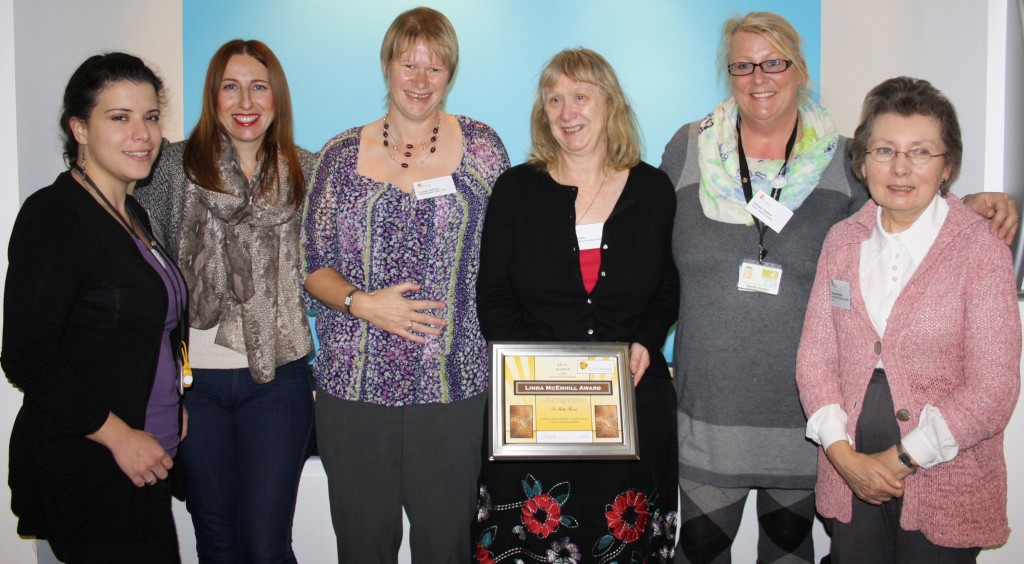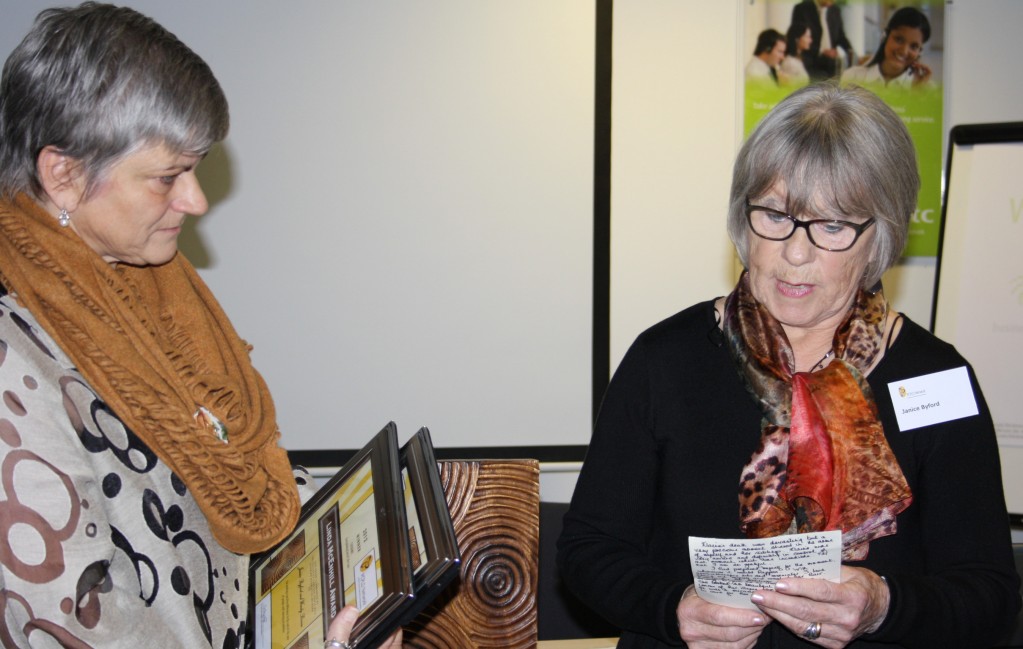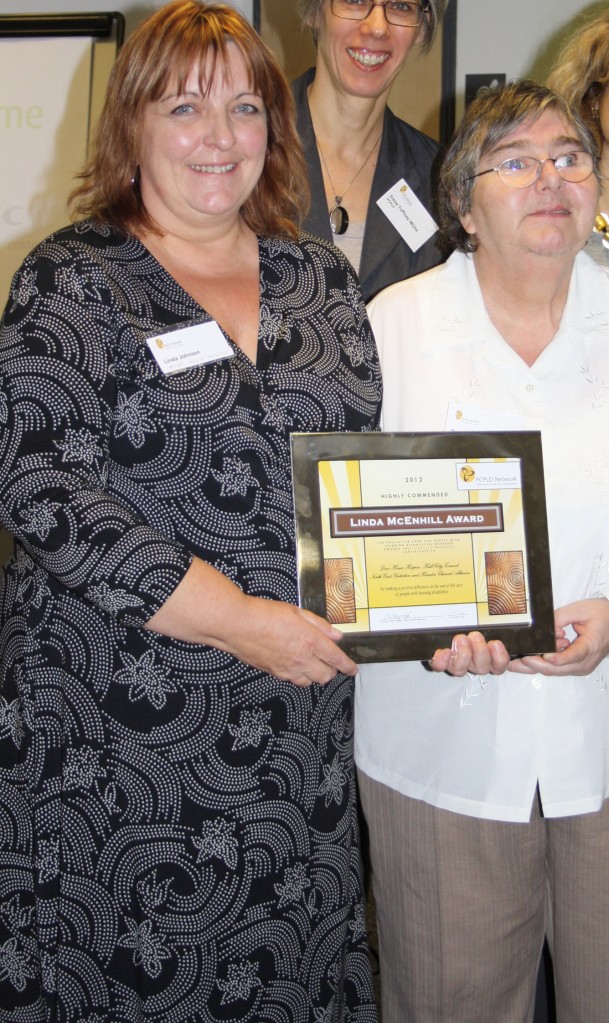2012 winner

Winner Dr Ruth Brown, The Isbister Centre, Hemel Hempstead, Hertfordshire
Category: “New Development/innovation/overall excellence in end of life care provision”
Nominator: Shirley Dayton, Community Learning Disability Team, Hertfordshire
Dr Ruth Brown, who works at a palliative care centre, was nominated for the award by Shirley Dayton, a health liaison nurse for people with learning disabilities, in recognition of “the excellent work she has undertaken over the last two years in supporting the specialist learning disability nurses in Hertfordshire to support people with a learning disability in the last year of their lives.”
Ruth’s work has its roots in the West Hertfordshire Palliative Care MDT Referrals Group, set up by a cross-organisational steering group (from palliative care and learning disability services) as part of a programme to improve palliative care service delivery to people with learning disabilities. Nurses and social workers from the community learning disability teams meet with palliative care specialists every month to discuss service users who are known to be at the end of life or suspected to die within a year. The group follows nationally established frameworks and pathways and has developed these to suit the needs of people with learning disabilities. Each service user within Hertfordshire is now offered and of life planning, with a clearly recognisable folder for their health action planning and communication tool.
Ruth has been instrumental in this group. She attends every monthly meeting, developed a local Resource pack making use of national best practice documents, and organises training for Community Learning Disability Nurses. She is described as “passionate” and “amazing”, and “very driven in ensuring that we keep updated in research”. Shirley, who nominated her, concludes: “No question is a silly question to Ruth; she has given advice and support and has helped the nurses build their confidence in a field of care that was new to the Learning Disability Nurses.”
The judges were impressed not only by Ruth’s clearly inspirational work and enthusiasm, but also by how her work is embedded in evidence-based practice and given a sustainable structure. There is now a programme of palliative care support for the Community Learning Disability Teams. The commitment from all sides to the monthly meetings is impressive, opening the possibility of early support for people with learning disabilities nearing the end of life. This is clearly not just one person’s work, but it often needs a dedicated individual to kick-start best practice. PCPLD Network is delighted to highlight Ruth Brown and her colleagues as an example of best practice.
Winner: Janice Byford, mother of Elaine Markou, and Wendy Broom, Clinical Nurse Specialist for Older Persons with Learning Disability, Cornwall, England
Category: Outstanding end of life support of an individual with learning disabilities
Nominator: Wendy Broom

Janice Byford is the mother of Elaine, who had Down syndrome and who had lived at home all her life. During the last years of life, Elaine developed dementia. She was referred to the Memory Service where Wendy is the Clinical Nurse Specialist. It took Janice a long time to accept that this referral was becoming necessary.
Wendy nominated Janice for the award “not because of the commitment that she gave to her daughter in supporting and caring for her, but because of what she taught me.” Janice not only helped Elaine to remain at home in a remarkable way, but she also provided Wendy and her colleagues with insight to how it felt to be the mother of a daughter who was losing all her skills. Whilst it may have seemed obvious to them that Elaine needed their professional services, Janice helped them to see how difficult and distressing this can be for families. Janice did not find it easy to accept the suggestions offered by the Memory Service (for example, the suggestion that Elaine should take medication) and took time to reflect on these, looking at alternatives that might fit better into their family values (which included support for alternative therapies and a healthy lifestyle). This prompted the professionals to reflect on what they offered families. However, when events overtook Janice (Elaine started having seizures) she accepted the anti-epileptic drugs without hesitation.
As Elaine’s health deteriorated, Janice found ways to support her whilst keeping her at the centre of family life. She was cared for in bed for the last 18 months of life. This happened downstairs in the conservatory, where Elaine was surrounded by brightly coloured cushions and parasols. Wendy comments: “. Whilst carers came in three times a day to carry out personal care, Janice supplemented this by meticulous attention to detailed care and wholesome cooking in a way only she could do best. The District Nurse who predicted that Elaine’s pressure sore was the beginning of the end had to review her expectations when it eventually healed up after ten months of diligent care and attention.
Wendy provided invaluable support to Janice, understanding her needs as a family carer. She helped to get all the right services in place at home when Elaine deteriorated during a weekend. Elaine died at home with her family around her.
The judges commented that all too often, the unique role of family carers is not completely understood and respected. Elaine’s mother helped the professionals to see the importance of offering support that suits families and gives them the space to be the unique and irreplaceable carers that they are. This very moving story demonstrates how families and professionals can work together, each bringing their own gifts and skills that do not replace but complement each other. The judges felt that in order for this to happen, it needs not only a very special family carer, but also a professional who is willing to be challenged and changed. For this reason, the judging panel decided to give the Linda McEnhill Award jointly to Janice (nominee) and Wendy (nominator).
Highly commended (straddling both categories):
Dove House Hospice, Hull City Council, North East Yorkshire and Humber Clinical Alliance
Nominator: Linda Johnson, Dove House Hospice

The case of Stephen illustrates how effective partnership, shared learning and a commitment to person-centred care leads to outstanding end of life care of a person with learning disabilities.
Stephen lived in Karelia Court, a residential care home for people with learning disabilities and autism. He was diagnosed with oesophageal cancer and the decision was made that palliative treatment was the most appropriate. The staff team at his home, who had demonstrated an impressive sensitivity and understanding of Stephen’s needs, re-visited and changed the person-centred information about him. As there was a dramatic increase in services and organisations involved in his care, the staff team helped all these new professionals to understand Stephen’s unique needs. Part of this was the need for continuity. It was agreed that Stephen could have any necessary treatment as an in-patient at Dove House Hospice. The hospice staff provided outstanding individualised support. They showed flexibility when Stephen’s friends (who all had autism) visited; they arranged for Stephen to visit the hospice when he was back home (to use the sensory bath which he enjoyed), thus ensuring continued positive links with the hospice; and they offered staff support and reassurance by ringing them daily when Stephen was at home. Stephen died in the hospice surrounded by the people he loved.
Although Stephen had a good death, the outstanding work did not end there. Both Hull City Council and Dove House Hospice acknowledged that this experience highlighted their inexperience of caring for an individual with learning disabilities. They approached North East Yorkshire and Humber Clinical Alliance (NEYHCA) to facilitate a reflective practice day which was attended by individuals from eight different services that had been involved in Stephen’s journey. This led to an action plan for improvement, a written report and a pictorial description of Stephen’s journey. There are now a number of clear action points for the hospice, Hull City Council and NEYHCA that demonstrates a commitment to improving end of life care for people with learning disabilities.
The judges were impressed by the evidently outstanding care of Stephen, which demonstrated a deep understanding of his individual needs, flexibility of services and strong professional support and collaboration between services. They were also impressed by the way in which services that had little previous experience of people with learning disabilities have used one experience to improve services in a sustainable way. They agreed with the nominator that “this was a particularly innovative piece of work, as Stephen had had a good death. There was no complaint to which the services needed to respond. Rather, Hull City Council and Dove House Hospice felt strongly that they could improve end of life care even further for people with a learning disability.”
